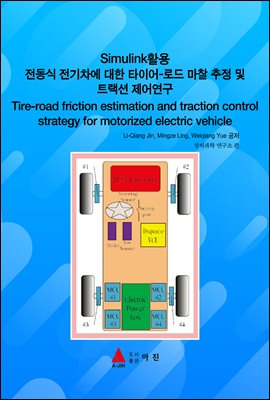
Simulink활용 전동식 전기차에 대한 타이어-로드 마찰 추정 및 트랙션 제어연구(Tire-road friction estimation and traction control st
- 저자Li-Qiang Jin, Mingze Ling, Weiqiang Yue 저
- 출판사아진
- 출판일2020-07-14
- 등록일2020-12-21
- SNS공유


- 파일포맷PDF
- 파일크기7MB
- 공급사YES24
-
지원기기
PC
PHONE
TABLET
프로그램 수동설치
전자책 프로그램 수동설치 안내
아이폰, 아이패드, 안드로이드폰, 태블릿,
보유 1, 대출 0,
예약 0, 누적대출 9, 누적예약 0
책소개
In this paper, an optimal longitudinal slip ratio system for real-time identificationof electric vehicle (EV) with motored wheels is proposed based on the adhesion
between tire and road surface. First and foremost, the optimal longitudinal slip
rate torque control can be identified in real time by calculating the derivative and
slip rate of the adhesion coefficient. Secondly, the vehicle speed estimation method
is also brought. Thirdly, an ideal vehicle simulation model is proposed to verify the
algorithm with simulation, and we find that the slip ratio corresponds to the
detection of the adhesion limit in real time. Finally, the proposed strategy is
applied to traction control system (TCS). The results showed that the method can
effectively identify the state of wheel and calculate the optimal slip ratio without
wheel speed sensor; in the meantime, it can improve the accelerated stability of
electric vehicle with traction control system (TCS).
목차
제 1편 : SIMULINK 기본편1.1 SIMULINK의 시작 1
블록의 연결 5
블록 파라미터의 설정 7
시뮬레이션 파라미터 (Configuration Parameters)의 설정 8
시뮬레이션의 수행 9
블록 파라미터의 표시 9
복수 데이터의 표시 11
2.2 동적 시뮬레이션 13
이차 미분방정식 17
선형 상태변수 모델 23
DC 모터의 시뮬레이션 24
함수 블록의 사용 29
차분방정식(difference equation)의 모델링 34
Subsystem(부시스템)의 구성 37
제 2편 : 연구논문
Tire-road friction estimation and traction control strategy for
motorized electric vehicle
1. Introduction 41
2. Estimation of optimum slip ratio on driving roads in real-time 43
3. Typical simulation experiments and results 48
4. Road test 49
5. Conclusion 53
6. References 57

















